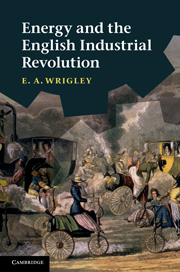Crossref Citations
This Book has been cited by the following publications. This list is generated based on data provided by Crossref.
DE VRIES, JAN 2011. INDUSTRIOUS PEASANTS IN EAST AND WEST: MARKETS, TECHNOLOGY, AND FAMILY STRUCTURE IN JAPANESE AND WESTERN EUROPEAN AGRICULTURE. Australian Economic History Review, Vol. 51, Issue. 2, p. 107.
Hoppit, Julian 2011. The Nation, the State, and the First Industrial Revolution. Journal of British Studies, Vol. 50, Issue. 2, p. 307.
DiMuzio, Tim 2012. Capitalizing a future unsustainable: Finance, energy and the fate of market civilization. Review of International Political Economy, Vol. 19, Issue. 3, p. 363.
Scheidel, Walter 2012. The Cambridge Companion to the Roman Economy.
INFANTE-AMATE, JUAN 2012. The Ecology and History of the Mediterranean Olive Grove: The Spanish Great Expansion, 1750 - 2000. Rural History, Vol. 23, Issue. 2, p. 161.
Stern, David I. and Kander, Astrid 2012. The Role of Energy in the Industrial Revolution and Modern Economic Growth. The Energy Journal, Vol. 33, Issue. 3, p. 125.
ALMEROTH-WILLIAMS, THOMAS 2013. The brewery horse and the importance of equine power in Hanoverian London. Urban History, Vol. 40, Issue. 3, p. 416.
Humphries, Jane 2013. The lure of aggregates and the pitfalls of the patriarchal perspective: a critique of the high wage economy interpretation of the British industrial revolution. The Economic History Review, Vol. 66, Issue. 3, p. 693.
Iriarte-Goñi, Iñaki 2013. Forests, Fuelwood, Pulpwood, and Lumber in Spain, 1860–2000: A Non-Declensionist Story. Environmental History, Vol. 18, Issue. 2, p. 333.
Godden, Chris 2013. In praise of Clio: Recent reflections on the study of economic history. OEconomia, p. 645.
Amate, Juan Infante de Molina, Manuel González Vanwalleghem, Tom Fernández, David Soto and Gómez, José Alfonso 2013. Erosion in the Mediterranean: The Case of Olive Groves in the South of Spain (1752–2000). Environmental History, Vol. 18, Issue. 2, p. 360.
Malm, Andreas 2013. The Origins of Fossil Capital: From Water to Steam in the British Cotton Industry. Historical Materialism, Vol. 21, Issue. 1, p. 15.
2013. Escaping poverty. p. 439.
MacKay, David J. C. 2013. Solar energy in the context of energy use, energy transportation and energy storage. Philosophical Transactions of the Royal Society A: Mathematical, Physical and Engineering Sciences, Vol. 371, Issue. 1996, p. 20110431.
Koyama, Mark 2013. Preindustrial Cliometrics. Economic Affairs, Vol. 33, Issue. 2, p. 268.
Wrigley, E. A 2013. Energy and the English Industrial Revolution. Philosophical Transactions of the Royal Society A: Mathematical, Physical and Engineering Sciences, Vol. 371, Issue. 1986, p. 20110568.
Cavert, William M. 2014. The Environmental Policy of Charles I: Coal Smoke and the English Monarchy, 1624–40. Journal of British Studies, Vol. 53, Issue. 2, p. 310.
Foster, John 2014. Energy, knowledge and economic growth. Journal of Evolutionary Economics, Vol. 24, Issue. 2, p. 209.
Weber, Heike Ortlepp, Anke Delitz, Heike Eggert, Manfred K. H. Stoessel, Marleen Saupe, Achim Schulz, Martin Samida, Stefanie Rheinberger, Hans-Jörg Holm, Christiane Schröder, Stefan Eisenhofer, Stefan Philipowski, Katharina Düllo, Thomas Liessmann, Konrad Paul Kastner, Kristin Soentgen, Jens Thiemeyer, Thomas Hennig, Nina Hildebrandt, Berit Neunert, Gregor Schneider, Florian Cress, Torsten Bräunlein, Peter J. Müller, Michael R. Möllers, Nina Westermann, Andrea and Böhme, Hartmut 2014. Handbuch Materielle Kultur. p. 157.
Auray, Sttphane Eyquem, Aurrlien and Jouneau-Sion, Frrddric 2014. Climatic Conditions and Productivity: An Impact Evaluation in Pre-Industrial England. SSRN Electronic Journal,





